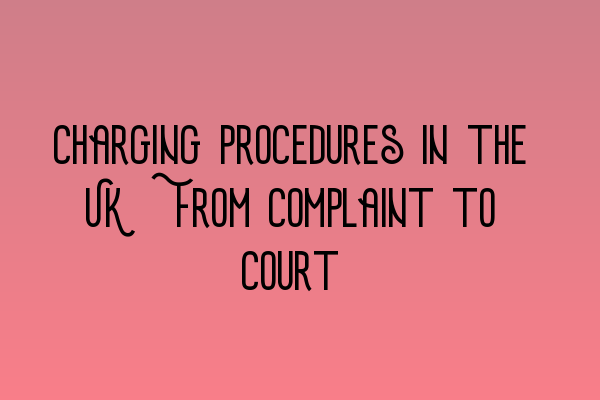Charging Procedures in the UK: From Complaint to Court
At SQE Criminal Law & Practice Law UK, we understand the importance of the charging procedures in the UK criminal justice system. The journey from complaint to court can be complex and intricate, and it is crucial to clarify the steps involved.
1. Complaint
The charging process typically starts with a complaint. This can be made by an individual, the police, or other authorities. It is vital that all complaints are thoroughly investigated to determine if there is sufficient evidence to proceed.
2. Investigation
Once a complaint is received, the authorities will commence an investigation. This phase includes gathering evidence, conducting interviews, and analyzing the facts of the case. The goal is to establish a clear understanding of the situation and assess whether a crime has been committed.
During the investigation process, it is important to respect the rights of all parties involved and ensure fairness. SQE Criminal Law & Practice Law UK is dedicated to upholding justice and protecting the rights of individuals.
3. Charging Decision
After the investigation, a charging decision will be made. This is a critical stage where the authorities determine whether there is enough evidence to support the charges. The decision is usually made by the Crown Prosecution Service (CPS) in England and Wales or the Procurator Fiscal in Scotland.
If the CPS or Procurator Fiscal believes there is sufficient evidence to proceed, they will formally charge the individual with the alleged offense. However, if there is insufficient evidence, the charges may be dropped.
4. Court Appearance
Once charged, the individual will be required to appear in court. The specific court will depend on the seriousness of the offense. In less serious cases, the trial may take place in a magistrates’ court, whereas more serious offenses will be heard in a crown court.
The court appearance is a critical stage in the criminal justice process. It is essential to have capable legal representation to ensure a fair trial and protect the interests of the accused. Our team at SQE Criminal Law & Practice Law UK specializes in providing comprehensive legal support.
5. Trial
During the trial, both the prosecution and defense will present their case. The prosecution will aim to prove the guilt of the accused, while the defense will mount a case to establish innocence or cast reasonable doubt on the prosecution’s evidence.
At SQE Criminal Law & Practice Law UK, our experienced solicitors provide expert guidance throughout the trial process. We believe in the importance of a fair and just trial, ensuring that the accused receives proper legal representation.
Conclusion
The charging procedures in the UK criminal justice system are vital in ensuring a fair and efficient resolution to criminal cases. From the initial complaint to court appearance and trial, each step is crucial in upholding justice.
If you would like to learn more about criminal law practice or prepare for the SQE exams, we recommend checking out our related articles:
- SQE 1 Practice Exam Questions
- SQE 1 Practice Mocks FLK1 FLK2
- SQE 2 Preparation Courses
- SQE 1 Preparation Courses
- SRA SQE Exam Dates
For further assistance or legal representation, please contact SQE Criminal Law & Practice Law UK. Our team is here to guide you through every step of the criminal law process.
